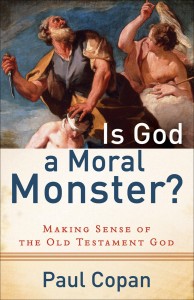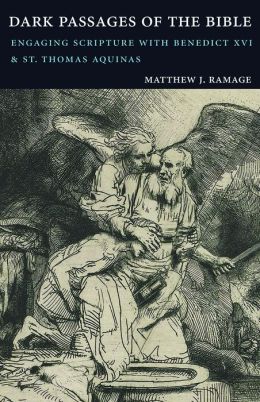In his bestselling book, The God Delusion, popular atheist Richard Dawkins shares this genial observation:
“The God of the Old Testament is arguably the most unpleasant character in all fiction: jealous and proud of it; a petty, unjust, unforgiving control-freak; a vindictive, bloodthirsty ethnic cleanser; a misogynistic, homophobic, racist, infanticidal, genocidal, filicidal, pestilential, megalomaniacal, sadomasochistic, capriciously malevolent bully.”
Well, then. I wish he hadn’t minced words.
All jokes aside, this view of God has become incredibly pervasive among non-Christians. In fact, judging from conversations I’ve had with hundreds of atheists and agnostics, I’d wager it’s one of the biggest stumbling blocks to faith today. How could the apparently angry and bloodthirsty God of the Old Testament be the same loving God of Jesus Christ? How could God sanction deplorable practices like slavery, homophobia, infanticide, and, worst of all, genocide? Did he simply change his mind or is that still his true character? How do Christians handle these so-called “dark passages” of the Bible?
Before answering these questions, we need to recognize a couple facts. First, these troubles are nothing new. It’s not as if contemporary atheist writers discovered these devastating problems which, for thousands of years, had escaped all believers. The truth is that Christians have wrestled with these difficult passages for centuries and have offered many resolutions.
For example, some like Marcion, a second-century bishop, suggest the Old Testament God is, in fact, a distorted version of the true God. Therefore Christians should excise the Old Testament from their religion. Of course most Christians, then and now, reject Marcionismm, seeing the Old and New Testaments in continuity with each other. But this is one way to handle the issue.
Others like Origen, a third-century writer, maintain that these passages do not record historical events but offer allegorical spiritual truths. For instance, when the psalmist says, “Blessed the one who seizes your children and smashes them against the rock” (Psalm 137:9), he’s encouraging God’s followers to destroy our childish, sinful tendencies that cry out for satisfaction. We cannot soothe or mollify sin. We must destroy it.
Over the years, theologians have provided several other views, but the point is that Christians have faced these difficulties from the beginning. They are nothing new, and plenty of satisfactory answers exist.
The second thing to realize—and this is more important—is that the Bible is not a single book, but a collection of books. It contains many different genres like poetry, letters, epic sagas, creation myths, biography, and theological history. And we can’t begin to understand any particular passage until we first recognize its genre.
This is no different than if you walked into a library today and someone handed you a book on Abraham Lincoln, quickly asking you to read it and explain the meaning. The first question you’d ask yourself is, “What genre is this book? What section did it come from?” Is it a meticulously-researched biography on the president or is it a copy of Abraham Lincoln: Vampire Hunter? Is it a comic book, a parallel history, or a collection of love poems Lincoln wrote to his wife? Until you know the genre, you can’t determine the book’s purpose—you don’t know which lens through which to interpret the book. But once you know its genre and purpose, then—and only then—are you prepared to make an informed judgment about its content.
Most atheists today display a remarkable inability to discern different genres throughout Scripture. They attempt to read Genesis through the same lens as the Psalms, Deuteronomy, 2 Samuel, the Gospel of Luke, and Revelation. And most of the time, this lens is the lens of modern journalism. The problem though is that none of the Bible was written in the way, according to today’s journalistic standards. In most cases, the biblical authors are not interested in specific historical details but in conveying theological and moral truths. This realization, in itself, solves many apparent difficulties in Scripture.
Once we begin with a firm grasp of these two basic principles, that the “dark passages” do not present new problems, and that to solve them we must first ascertain their genre, then we’re prepared to explore adequate solutions. Thankfully, many Christians today are rolling out tools for understanding these “dark passages” and I’d like to highlight a few of them.
 First, the best book on this subject, and one I’ve recommended countless times, is Dr. Paul Copan’s Is God a Moral Monster?: Making Sense of the Old Testament God (Baker, 2011). Copan devotes whole chapters, and often more than one, to questions about whether God is genocidal, needlessly violent, pro-slavery, supportive of child abuse, or arbitrary in the laws and restrictions he places on the Old Testament people. Copan is a Protestant apologist, which means he takes a few interpretive moves Catholics would probably not embrace, but on the whole it’s the best popular-level book on the subject. Here’s the publisher’s description:
First, the best book on this subject, and one I’ve recommended countless times, is Dr. Paul Copan’s Is God a Moral Monster?: Making Sense of the Old Testament God (Baker, 2011). Copan devotes whole chapters, and often more than one, to questions about whether God is genocidal, needlessly violent, pro-slavery, supportive of child abuse, or arbitrary in the laws and restrictions he places on the Old Testament people. Copan is a Protestant apologist, which means he takes a few interpretive moves Catholics would probably not embrace, but on the whole it’s the best popular-level book on the subject. Here’s the publisher’s description:
“A recent string of popular-level books written by the New Atheists have leveled the accusation that the God of the Old Testament is nothing but a bully, a murderer, and a cosmic child abuser. This viewpoint is even making inroads into the church. How are Christians to respond to such accusations? And how are we to reconcile the seemingly disconnected natures of God portrayed in the two testaments? In this timely and readable book, apologist Paul Copan takes on some of the most vexing accusations of our time, including:
- God is arrogant and jealous
- God punishes people too harshly
- God is guilty of ethnic cleansing
- God oppresses women
- God endorses slavery
- Christianity causes violence and more
Copan not only answers God’s critics, he also shows how to read both the Old and New Testaments faithfully, seeing an unchanging, righteous, and loving God in both.”
 A second great resource, written by Dr. Matthew Ramage, a biblical scholar at Benedictine College, is the just-released book, Dark Passages of the Bible: Engaging Scripture with Benedict XVI and St. Thomas Aquinas (Catholic University of America Press, 2013). It’s a bit more scholarly than Copan’s book, and Ramage is more interested in interpretive principles rather than their application to specific biblical instances, but he’s written a deeply engaging and important book on the “dark passages”, the best to date from a Catholic perspective. I’ve been absorbing it over the last few weeks and plan to interview Dr. Ramage here soon. Here’s the publisher’s description:
A second great resource, written by Dr. Matthew Ramage, a biblical scholar at Benedictine College, is the just-released book, Dark Passages of the Bible: Engaging Scripture with Benedict XVI and St. Thomas Aquinas (Catholic University of America Press, 2013). It’s a bit more scholarly than Copan’s book, and Ramage is more interested in interpretive principles rather than their application to specific biblical instances, but he’s written a deeply engaging and important book on the “dark passages”, the best to date from a Catholic perspective. I’ve been absorbing it over the last few weeks and plan to interview Dr. Ramage here soon. Here’s the publisher’s description:
“Multiple gods? Divinely mandated genocide? Rejection of an afterlife? If the Scriptures are the inspired and inerrant word of God that Christians claim them to be, how can they contain these things? For many believers in the modern age, traditional Christian answers to these challenges are no longer convincing. Though spiritually edifying, they are unable to account for the sheer scope and depth of problems raised through the advent of historical-critical scholarship.
Following the lead of Pope Benedict XVI, in Dark Passages of the Bible Matthew Ramage weds the historical-critical approach with a theological reading of Scripture based in the patristic-medieval tradition. Whereas these two approaches are often viewed as mutually exclusive or even contradictory, Ramage insists that the two are mutually enriching and necessary for doing justice to the Bible’s most challenging texts. Ramage applies Benedict XVI’s hermeneutical principles to three of the most theologically problematic areas of the Bible: its treatment of God’s nature, the nature of good and evil, and the afterlife. Teasing out key hermeneutical principles from the work of Thomas Aquinas, Ramage analyzes each of these themes with an eye to reconciling texts whose presence would seem to violate the doctrines of biblical inspiration and inerrancy. At the same time, Ramage directly addresses the problems of concrete biblical texts in light of both patristic and modern exegetical methods.”
Third, today at Strange Notions, Jimmy Akin has contributed a helpful article titled “Pope Benedict on the ‘Dark Passages’ of Scripture”. Jimmy focuses on the Pope’s exhortation, Verbum Domini, likely the most significant Church document on Scripture in the last fifty years, along with the Synod on the Word of God from which the exhortation resulted. If the books above look too long or challenging, read Jimmy’s article for a short and easy introduction to handling the “dark passages.”
Finally, Fr. Robert Barron just released two helpful YouTube commentaries on violence in the Old Testament. Sharing the view of Origen, he reads these passages allegorically. He maintains that they are meant to convey spiritual truths about the necessity of eradicating sin, not a historical, journalistic account of murder or infanticide. On this view, whether such massacres actually took place historically, or whether God actually commanded them, are both secondary questions.
Which “dark passages” do you find most troubling?

